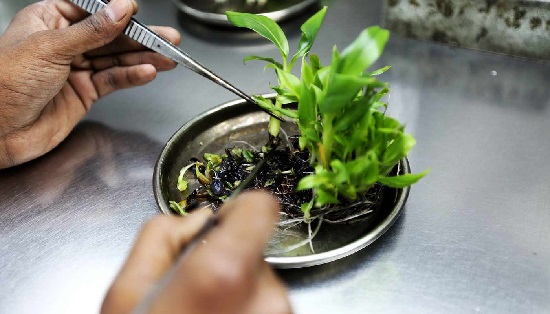
BY ALAZAR SHIFERAW
Various researches have been conducted to address different social and developmental problems of countries. Nevertheless, very often these research conducts could not achieve the desired needs of the countries at maximum level. Unless they are supported by modern biotechnological tools, they could not be successful. Although, Ethiopia is endowed with immense genetic biodiversity, yet, this biodiversity is not used for the country’s economic development purpose at maximum level.
Biotechnology in the agriculture sector covers indigenous plant and animal breeding to the choice of individuals and hybridization including technically complicated techniques of genetic engineering. The beneficiaries are farmers, manufacturers and consumers. Ethiopia has been regarded as one among the ancient countries of the world and also richest in natural resources and crop diversity, indicated in I.K.Press Research Journal.
Specially, plant biotechnology portrays immense capacity for manipulation of crops to conclude with the use of least inputs, increased yield and productivity. It is a smart choice and very much necessary for the introduction of latest biotechnological tools to Ethiopian agricultural sector. Careful examination of crop varieties of Ethiopia through the usage of modern tools and techniques of biotechnology could certainly assist in unraveling genes that harness traits of colossal economic significance.
Quite a few research and academic institutes of Ethiopia are conducting basic, advanced and related fields of research in biotechnology with limitations in tools, techniques and management. Updating the information on status of research, opportunities and challenges in plant biotechnology will help the researchers, academicians, industrialists and students to know about the current status of Ethiopian plant biotechnology is very crucial, it said.
Journal of Advance in Agriculture, in its “ Plant Tissue Culture Research and Development in Ethiopia: A Case Study on Current Status, Opportunities, and Challenges edition by Yemisrach Melkie and Dagmawit Chomb among others said that Plant Tissue Culture (PTC) techniques are the most frequently used biotechnology tools ranging from basic to applied investigation purposes in plant sciences.
The history of PTC research dates back to 1902, when Haberlandt cultured tissue from a Tradescantia plant species. Since then, PTC has significantly impacted the current agriculture system worldwide and every year, hundreds of results and reports regarding the application of tissue culture techniques, applied to breeding programs, genetic and biodiversity conservation, and biopharmaceutical production are documented. Chemical and hormonal control of regeneration, basic and applied aspects of organogenesis and somatic embryogenesis, micropropagation and production of virus-free plants, haploid plants, production of secondary metabolites, and large-scale cell culture in bioreactors are few landmarks and notable discoveries in PTC research.
The application of tissue culture technology as a central tool or as an adjunct to other methods, including recombinant DNA techniques, is at the vanguard in plant modification and improvement. Biotechnology tools like genetic transformation and gene editing rely on the technical aspects of PTC. In the development of Genetically Modified (GM) and gene-edited crops, tissue culture is the primary tool to transfer target genes into host plants and regenerate the transgenic plants. The selection of transformed or gene-edited plantlets and to multiply the final genetically modified or gene-edited genotypes is based on PTC techniques.
Furthermore, PTC is also widely used for the multiplication of disease-free plants and the conservation of endangered plant species both on a commercial scale and on a small scale level. Besides, PTC was used to improve the production of pharmaceutically important secondary metabolites in medicinal plants. Despite the huge potential of PTC in agriculture, its use and application in developing countries like Ethiopia are in its infancy.
In Ethiopia, the first PTC research laboratory was established at Ethiopian Agricultural Research Institute, Holeta Agricultural Research Center, and at Addis Ababa University, Department of Biology in 2000. Since then, there has been an exponential expansion in Ethiopian tissue culture research laboratories at regional agricultural research institutes and higher learning institutions. Commercial tissue culture was started in Ethiopia in 2006 when Tigray Biotechnology Center (TBC), PLC was established as the first private PTC laboratory, it said.
Then the remarkable development and startup of commercial laboratories followed in different parts of the country, such as Bahir Dar TC Enterprise, Waginos Biotech, and Dessie Tissue Culture Laboratory. However, there is a lack of information at the national level on the capacity of institutions in terms of available infrastructure and skilled human power, the potential of the laboratories for tissue culture related activities, and existing challenges that hinder tissue culture research and development.
Researchers said that scientific innovation and its derivative benefits have had profound implications for humanity within the last century. The exciting discipline of biotechnology has drawn the interests of traditional biologists, biochemists, microbiologists, medical and agricultural scientists into applying mathematical and engineering models to understanding biology.
Furthermore, several scientists in the exact sciences of mathematics, physics, and chemistry have begun to use system approaches to unravel the mystery and complexity of biology. And from the side, diagnostic, biopharmaceutical, biochemical and agricultural industries are rapidly drawing from and applying the research results of biotechnology. Moreover, new industries relying on genomics are springing up daily to challenge the way things have been done. The final results may be several years away, but biotechnology will experience a revolution like none before in the life sciences and will affect every facet of our lives, from crop improvement to commerce, and drugs to sustainable development.
Many of the most important and challenging problems of modern science require a multidisciplinary and an integrative approach. Working in areas that fall between the standard disciplines requires that barriers be broken down. Modern biotechnologies have established mechanisms to enable integrative research to develop. Even large companies, subsidiaries and joint ventures, universities, research organizations, small companies and startups are starting to interact in non-traditional ways. Recent revolutionary advances in genomic sequencing has opened the way for a deepened understanding of the organization of genomes and the way in which variations in the DNA of individuals influence their phenotypes.
The fundamental goal of cell biology is to understand physiology in terms of the information encoded in the cell’s genome. Molecular biology on the other hand provides a detailed description of the components of biological networks, and the organizational principles of these networks are becoming increasingly apparent.
Therefore, the major challenge facing human biologists in the 21st century is in identifying how variations in the human genome contribute to the onset and progression of common disorders which have both genetic and environmental determinants. In this first special issue of the African Journal of Biotechnology, there are reviews and perspectives by specialists with timely information on biotechnology issues in diverse fields including industrial ecology, in vitro culture techniques, transgenic technology, genetic conservation, molecular diagnostics and biopharmaceuticals.
The challenge for Africa is two-fold. There is the urgent need to be competent in the application of these innovative researches in industries and to teach the necessary skills to the next generation of scientists. This will require a scheme to lure back skilled African researchers from the western world to the universities and private sector in order to facilitate biotechnology education and industrialization it said.
THE ETHIOPIAN HERALD AUGUST 27/ 2021





